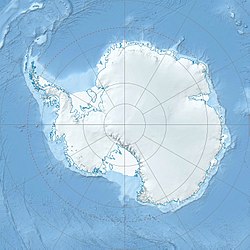Holme Bay
| Holme Bay | ||
|---|---|---|
| Gewässer | Kooperationssee | |
| Landmasse | Mac-Robertson-Land, Ostantarktika | |
| Geographische Lage | 67° 34′ S, 62° 42′ O | |
| Breite | 38 km | |
| Inseln | Azimuth Islands, Baseline Rock, Canopus-Inseln, Canopus Rocks, Departure Rocks, Dyer Island, East Budd Island, Entrance Island, Flat Islands, Gibbney Island, Giganteus Island, Hansen Rocks, Hump Island, Jocelyn-Inseln, Kellas-Inseln, Klungholmane, Lee Island, Nøstet, Parallactic Islands, Peake-Jones Rock, Ring Rock, Rookery Islands, Rouse-Inseln, Sawert Rocks, Smith Rocks, Wiltshire Rocks | |
| Zuflüsse | Forbes-Gletscher | |
Die Holme Bay ist eine 38 km breite Bucht an der Mawson-Küste des ostantarktischen Mac-Robertson-Lands. Sie liegt rund 8 km nördlich der Framnes Mountains.
Norwegische Kartografen kartierten sie anhand von Luftaufnahmen, die bei der Lars-Christensen-Expedition 1936/37 entstanden. Sie benannten sie Holmevika nach den zahlreichen Inseln (norwegisch holmen), die sich in der Bucht befinden. Das Advisory Committee on Antarctic Names übersetzte 1947 den Namen ins Englische.
Weblinks
- Holme Bay auf geographic.org (englisch)
- Holme Bay. In: Geographic Names Information System. United States Geological Survey, United States Department of the Interior, archiviert vom (englisch).
- Home Bay im Composite Gazetteer of Antarctica (englisch)
Auf dieser Seite verwendete Medien
Autor/Urheber: Alexrk2, Lizenz: CC BY-SA 3.0
Physische Positionskarte Antarktis, Mittabstandstreue Azimutalprojektion

